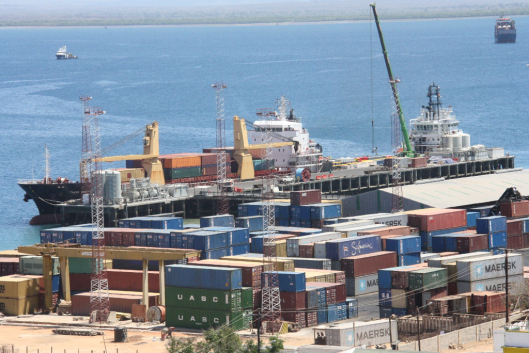Mozambique: Fisheries monitoring project launched - AIM
Investment incentives in Mozambique “balanced” with need for revenue – Economics

File photo / Pemba port
While much of Mozambique’s future economic growth hopes centre on investment, the collection of much-needed revenue to balance public accounts is also vital.
According to tax law expert Bruno Santiago, co-author with Sara Teixeira of a study on Mozambican tax law launched last Thursday in Lisbon, the Mozambican state has maintained the balance between investment incentives and budgetary needs well. But there is still work to be done.
For the author of “International Tax Law of Mozambique – The Double Tax Conventions”, Mozambique is “perhaps the Portuguese-speaking country with the best balance between these two conflicting interests: giving up tax revenue to attract investment and ensuring the minimum tax revenue for public accounts”.
Speaking to Africamonitor.net, the lawyer at firm Morais Leitão, Galvão Teles, Soares da Silva and Associados also identifies weaknesses in law enforcement. “It is necessary to adjust and update practices to what results from the law. And it is necessary to review the tax litigation for a true realization of the rule of law, that is, for taxpayers to feel the security and comfort that comes from guaranteeing access to the law and the courts,” he said.
In the matter of double taxation, which is known to be harmful to both investment and savings, Mozambican law “establishes some legal and economic mitigation mechanisms”, which are complemented by the conventions for the avoidance of double taxation signed with some [the country’s] largest trading partners”. These, he said, “allow [us] to ensure, if not the elimination of double taxation, then at least an attenuation, in a significant number of situations”.
The book focuses on Macau and Portugal as platforms for investment in Mozambique. For Santiago, both can “play a major role in the channelling of foreign investment”, in the first case as a platform for investment “originating in all Asia and Oceania”, and in the second for Europe.
The main advantages of Macau and Portugal assuming these roles are linked to the fact that they are in the “privileged position” of having conventions which avoid double taxation, in addition to sharing the Portuguese language with Mozambique.
“Mozambique’s International Tax Law – Double Taxation Conventions” was launched on Thursday in the law practice’s auditorium in the presence of the Mozambican ambassador, Fernanda Lichale.
The Chinese embassy in Lisbon was represented by political adviser Nie Quan, and AICEP, the Portuguese global trade investment agency, by chairman Vital Morgado.












Leave a Reply
Be the First to Comment!
You must be logged in to post a comment.
You must be logged in to post a comment.